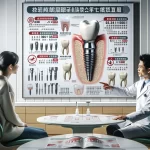Embarking on the journey to restore your smile with dental implants is an exciting and transformative experience. At Nuvia Dental Implant Center, we understand that concerns about post-surgical discomfort can overshadow this joy. Our commitment is to prioritize your comfort throughout the entire process, especially during recovery.
Understanding Post-Surgical Discomfort
Experiencing discomfort after dental implant surgery is a common concern. The procedure involves minor trauma to your jawbone and surrounding tissues, which can lead to swelling, bruising, and soreness. However, with effective pain management techniques and adherence to our post-operative care instructions, you can minimize discomfort and enjoy a surprisingly smooth recovery.
Nuvia’s Commitment to Your Comfort
At Nuvia Dental Implant Center, we specialize in minimally invasive dental implant procedures designed to reduce post-operative discomfort compared to traditional methods. Our highly skilled professionals are dedicated to providing a seamless and comfortable experience for all our patients.
Personalized Pain Management Strategies
Recognizing that each patient’s experience is unique, we tailor our pain management strategies to meet your individual needs. Our comprehensive approach combines advanced techniques with proven methods to ensure your comfort throughout the recovery process.
Cold Therapy
One of the most effective ways to manage post-surgical discomfort is through cold therapy. We recommend:
- Using an ice pack or a bag of frozen peas wrapped in a clean cloth.
- Applying it to the affected area for 20 minutes at a time, allowing for 20-minute breaks in between.
This simple yet powerful technique can significantly reduce swelling and alleviate discomfort.
Medication Management
Depending on your specific needs, our doctors may prescribe pain medication or recommend over-the-counter anti-inflammatory drugs. We provide detailed instructions on how to take these medications safely and effectively, ensuring optimal pain relief without adverse side effects.
Elevation and Rest
Proper rest and elevation are crucial components of a comfortable recovery:
- Sleep with your head elevated above your heart to minimize swelling.
- Take it easy and avoid strenuous activities during the initial recovery period.
These practices allow your body the time it needs to heal properly.
Comprehensive Post-Operative Care
Our commitment to your comfort extends beyond the surgical room. At Nuvia Dental Implant Center, we schedule follow-up appointments to monitor your progress and adjust your pain management plan as necessary. Our team is always available to address any concerns you may have during your recovery journey.
Your Role in a Comfortable Recovery
While we strive to provide the best possible care, your active participation is essential for a smooth recovery. Adhering to our post-operative instructions—including maintaining proper oral hygiene, following dietary recommendations, and attending follow-up appointments—can significantly enhance your comfort and promote successful healing.
Embrace the Excitement of Your New Smile
At Nuvia Dental Implant Center, we believe that the journey toward a new smile should be filled with excitement rather than anxiety. Our innovative approach to dental implant surgery ensures that you can look forward to a surprisingly comfortable recovery and a beautiful, long-lasting smile.
If you’re ready to embark on this transformative journey, take our 60-second eligibility quiz to see if you’re a candidate for our Permanent Teeth in 24 Hours solution. Let us guide you through this process, providing the care you deserve for a rewarding experience from start to finish.
The Nuvia Difference: Redefining Comfort in Dental Implant Recovery
We understand that concerns about post-surgical discomfort can be daunting. However, at Nuvia Dental Implant Center, we are committed to redefining the recovery experience—making it not only comfortable but also surprisingly pleasant.
Advanced Pain Management Strategies
Our comprehensive approach combines advanced techniques tailored specifically for you:
- Cold Therapy: Effective for reducing swelling.
- Medication Management: Customized prescriptions based on individual needs.
- Elevation and Rest: Essential for minimizing swelling and promoting healing.
Conclusion: A Comfortable Journey Toward Your Radiant Smile
At Nuvia Dental Implant Center, we are dedicated to ensuring that your recovery from dental implant surgery is as comfortable as possible. With our focus on minimally invasive techniques and personalized pain management strategies, we aim not only to ease any discomfort but also make this journey enjoyable.
By actively participating in your recovery—following our guidelines for care—you can look forward to embracing your new smile with confidence. If you’re ready for this life-changing experience, take our eligibility quiz today! Let us support you every step of the way toward achieving the beautiful smile you deserve.
For more information about our services or to schedule an appointment, visit Nuvia Dental Implant Center.
What can I expect in terms of pain after Nuvia Dental Implant surgery?
Post-surgery, you may experience some discomfort and swelling, which typically peaks and then begins to fade within a few days. Most patients manage discomfort with over-the-counter pain relievers, but stronger medications can be provided if necessary.
How long does the recovery process take after Nuvia Dental Implant surgery?
The soft tissue healing process takes approximately seven to ten days. However, the bone and the implant themselves go through several months of healing. At Nuvia, you can receive your full mouth dental implants in 24 hours, and the entire process can be completed in just a few days.
What are some tips for a smooth recovery after Nuvia Dental Implant surgery?
How does Nuvia ensure a comfortable experience during the recovery process?
Nuvia prioritizes patient comfort by providing comprehensive post-operative care instructions and a detailed consultation. They also use advanced technology for precise implant placement and rapid healing.
What kind of aftercare is involved with Nuvia Dental Implants?
Aftercare for Nuvia Dental Implants typically involves following a soft diet, maintaining good oral hygiene, and attending follow-up appointments to monitor healing and implant integration.







